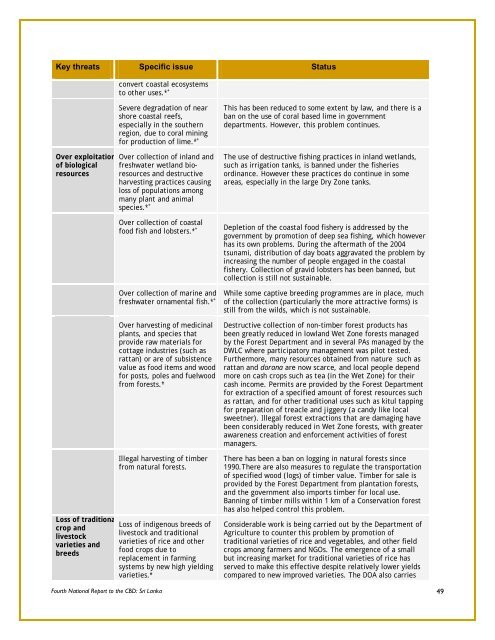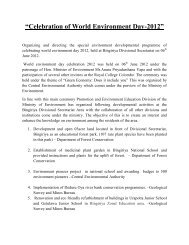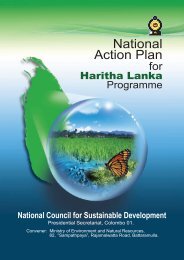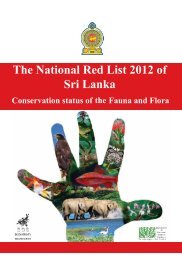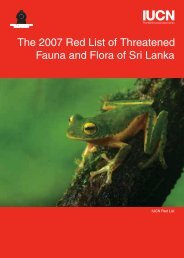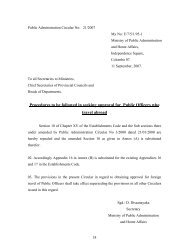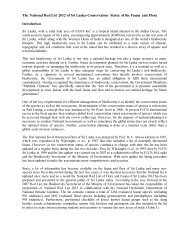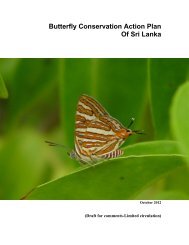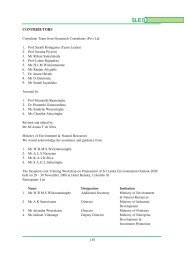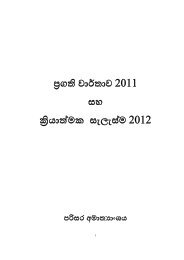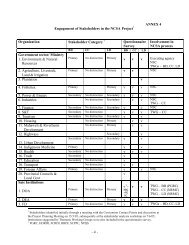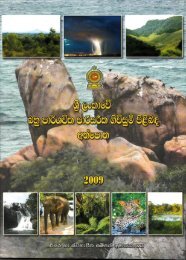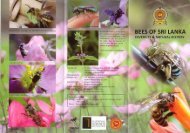English - Convention on Biological Diversity
English - Convention on Biological Diversity
English - Convention on Biological Diversity
You also want an ePaper? Increase the reach of your titles
YUMPU automatically turns print PDFs into web optimized ePapers that Google loves.
Key threats Specific issue Statusc<strong>on</strong>vert coastal ecosystemsto other uses.* +Over exploitati<strong>on</strong>of biologicalresourcesLoss of traditi<strong>on</strong>acrop andlivestockvarieties andbreedsSevere degradati<strong>on</strong> of nearshore coastal reefs,especially in the southernregi<strong>on</strong>, due to coral miningfor producti<strong>on</strong> of lime.* +Over collecti<strong>on</strong> of inland andfreshwater wetland bioresourcesand destructiveharvesting practices causingloss of populati<strong>on</strong>s am<strong>on</strong>gmany plant and animalspecies.* +Over collecti<strong>on</strong> of coastalfood fish and lobsters.* +Over collecti<strong>on</strong> of marine andfreshwater ornamental fish.* +Over harvesting of medicinalplants, and species thatprovide raw materials forcottage industries (such asrattan) or are of subsistencevalue as food items and woodfor posts, poles and fuelwoodfrom forests.*Illegal harvesting of timberfrom natural forests.Loss of indigenous breeds oflivestock and traditi<strong>on</strong>alvarieties of rice and otherfood crops due toreplacement in farmingsystems by new high yieldingvarieties.*This has been reduced to some extent by law, and there is aban <strong>on</strong> the use of coral based lime in governmentdepartments. However, this problem c<strong>on</strong>tinues.The use of destructive fishing practices in inland wetlands,such as irrigati<strong>on</strong> tanks, is banned under the fisheriesordinance. However these practices do c<strong>on</strong>tinue in someareas, especially in the large Dry Z<strong>on</strong>e tanks.Depleti<strong>on</strong> of the coastal food fishery is addressed by thegovernment by promoti<strong>on</strong> of deep sea fishing, which howeverhas its own problems. During the aftermath of the 2004tsunami, distributi<strong>on</strong> of day boats aggravated the problem byincreasing the number of people engaged in the coastalfishery. Collecti<strong>on</strong> of gravid lobsters has been banned, butcollecti<strong>on</strong> is still not sustainable.While some captive breeding programmes are in place, muchof the collecti<strong>on</strong> (particularly the more attractive forms) isstill from the wilds, which is not sustainable.Destructive collecti<strong>on</strong> of n<strong>on</strong>-timber forest products hasbeen greatly reduced in lowland Wet Z<strong>on</strong>e forests managedby the Forest Department and in several PAs managed by theDWLC where participatory management was pilot tested.Furthermore, many resources obtained from nature such asrattan and dorana are now scarce, and local people dependmore <strong>on</strong> cash crops such as tea (in the Wet Z<strong>on</strong>e) for theircash income. Permits are provided by the Forest Departmentfor extracti<strong>on</strong> of a specified amount of forest resources suchas rattan, and for other traditi<strong>on</strong>al uses such as kitul tappingfor preparati<strong>on</strong> of treacle and jiggery (a candy like localsweetner). Illegal forest extracti<strong>on</strong>s that are damaging havebeen c<strong>on</strong>siderably reduced in Wet Z<strong>on</strong>e forests, with greaterawareness creati<strong>on</strong> and enforcement activities of forestmanagers.There has been a ban <strong>on</strong> logging in natural forests since1990.There are also measures to regulate the transportati<strong>on</strong>of specified wood (logs) of timber value. Timber for sale isprovided by the Forest Department from plantati<strong>on</strong> forests,and the government also imports timber for local use.Banning of timber mills within 1 km of a C<strong>on</strong>servati<strong>on</strong> foresthas also helped c<strong>on</strong>trol this problem.C<strong>on</strong>siderable work is being carried out by the Department ofAgriculture to counter this problem by promoti<strong>on</strong> oftraditi<strong>on</strong>al varieties of rice and vegetables, and other fieldcrops am<strong>on</strong>g farmers and NGOs. The emergence of a smallbut increasing market for traditi<strong>on</strong>al varieties of rice hasserved to make this effective despite relatively lower yieldscompared to new improved varieties. The DOA also carriesFourth Nati<strong>on</strong>al Report to the CBD: Sri Lanka 49


